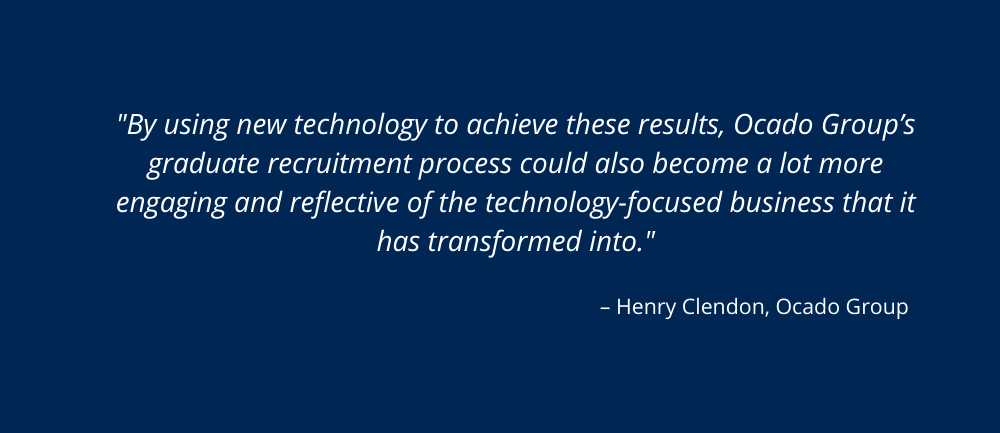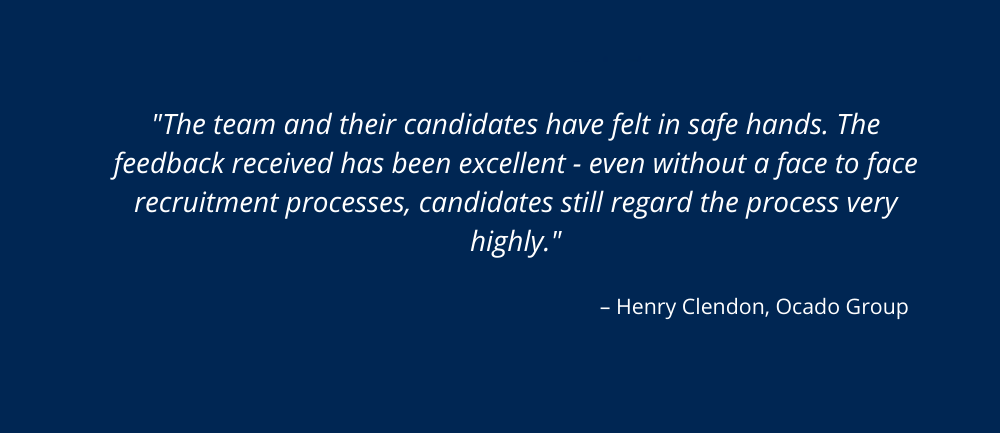-
Provided by

- Date published: Aug 1, 2021
- Categories
Ocado Group is the fastest growing technology business in the FTSE 100. Its mission is to transform online grocery through cutting-edge technology and automation. Working with some of the world’s biggest, most innovative, and forward-thinking grocery retailers, Ocado Group helps them redefine their customers’ online shopping experience and be leaders in their markets.
It had to transform from retail to tech while helping grocery retailers redefine their online shopping experiences. It has adapted successfully, however, with a positive growth rate, it plans to recruit another 500 tech specialists at different levels of the business this year.
Here Henry Clendon, who leads talent strategy at Ocado Group, talks about how the firm has innovated to attract, select and retain top talent.
Defining the talent challenge
These changes require a talent strategy that can successfully cater for these new roles and strategies. For Ocado Group’s recruitment processes, it was vital to ensure the candidates with the right skills were identified and, more still, that individuals would be selected who wanted to and were able to grow alongside the company.
Specifically, these goals required the establishment of a hiring process that could attract, identify and select a diverse group of individuals who would be well-suited to the future of the business. Diversity was key in this new phase.
The firm previously found that its recruitment strategy restricted the kinds of candidates who would make it through to later recruitment stages, stifling the possibility of those with a good skill set but with lower academic credentials. Its system, for example, discounted those who didn’t have ABB results (or higher) from an established university. They realised that this was problematic for a company that increasingly needed diverse skills for a variety of roles and to create a future-ready workforce.
Embracing the benefits of innovation
The talent team knew they had to transform their graduate recruitment processes and started by removing academic qualifications from their search criteria and moving away from standard resume screening processes, traditional online verbal and numerical reasoning tests. Instead, they turned to behavioural qualities, enabling them to find candidates with traits such as adaptability, curiosity, learnability as well as the ability to embrace change; the qualities that are vital for Ocado Group’s current and future needs.
This new Emerging Talent Programme allowed for a talent transformation that not only promoted inclusivity in Ocado Group but gave them an edge over competitors – empowering them to find candidates who traditionally would be overlooked but actually provide new perspectives, fresh ideas, dynamism and bring with them a host of new possibilities for Ocado Group’s teams.
By using new technology to achieve these results, Ocado Group’s graduate recruitment process could also become a lot more engaging and reflective of the technology-focused business that it has transformed into. In turn, the completion rate of assessments was far higher, averaging at 80% across the pre-assessment day stages. Not only did this better support candidates throughout the process but it gave them a stronger understanding of the way the business would work before entering a role.

Artificial intelligence and the human touch
The new programme relied on artificial intelligence and digital assessment tools to help hiring managers identify diverse people and save time in the process. Working with Aon’s Assessment Solutions, they introduced a series of online assessments which worked to measure the preferred behaviours. A gamified cognitive test was also put in place to measure adaptability to change and working memory.
In later stages – for candidates who achieved higher scores – recorded video interviews were then introduced using the platform. For this, candidates uploaded a response to each question before the system analysed and scored their spoken words against the Group’s competencies.
In this process, AI mimics human raters by finding positive and negative behavioural indicators that can be linked to different personality traits. Like a human would, the AI technology then uses these indicators to give candidates a score for their answers but removes any human bias that could have been based on appearance, visual cues or speech tone.
For each of these steps, the entire process was automated and completed online which enabled a smooth operation for Ocado Group’s hiring teams and reduced the need for candidates to travel to test centres or interviews.

Securing support from the C-suite
Before this technology could be implemented, it was necessary to prove the return on investment and demonstrate how the processes would aid the wider company strategy.
After putting together the business case for the C-suite, the data was clear that the new system would save time and also make Ocado Group market leaders in using technology to drive their diversity and inclusion initiatives.
For Ocado Group’s diversity and inclusion recruitment initiatives, the benefits were also clear. There was hard evidence that the AI technology removed a large portion of unconscious bias from the process and could back up each of its decisions based on data. It was evident that the technology not only worked but was a perfect fit for the technology-based future of the organisation, using tech to make their own work more efficient.
After completing two recruitment cycles using this technology, hiring teams could track the diversity and inclusion performance within the hiring process and continually build the business case. Using data from the recruitment stages as well as Ocado Group-specific data on the diverse group of candidates who had entered the business and proved to be performing well, it was possible to substantiate the benefits and possibilities of the process to the C-suite.
Achieving positive and measurable outcomes
The results were powerful. Ocado Group recognised that by changing the focus of their talent selection from academic achievements to candidate behaviours, 33% of individuals that came through the recruitment processes wouldn’t previously have made it through and 40% more candidates than normal passed the application stage.
But not only did more pass the tests, more people and a higher calibre of individuals applied in the first place. After new measures were introduced, there was a 300% growth in people applying for roles and 650% increase in video assessments.
The experience of the process for both hiring teams and candidates greatly improved too. Under new testing and interview processes, candidates came through an engaging and immersive experience to learn what it would truly be like to work for Ocado Group, while hiring managers saved nearly 600 hours of interview time.
Ultimately, the transformation secured a diverse group of individuals to work within its teams after attracting candidates from a broader talent pool. The gender split of graduates hired in 2020 was 53% female and 45% male, compared to 35% female and 64% male the year previously. Seventy-three graduates from diverse backgrounds were ultimately hired.

Reflecting on the changes brought about
We knew we had to change our systems and in some instances were nervous about doing so. Looking back, it’s important to trust the process, perhaps more so than we did at first.
There was nervousness about the ability of the technology to effectively identify the right candidates. But ultimately, the AI has reduced bias that humans couldn’t have detected and the candidate centres picked up on the best individuals for our needs.
With so many applicants too, trying something so new was daunting. But in the end, the team and their candidates have felt in safe hands. The feedback received has been excellent – even without face-to-face recruitment processes, candidates still regard the process very highly so they know that the AI provides a great candidate experience whilst providing effective results.

Broadening the strategic ambitions
Based on the results of the new recruitment strategy, Ocado Group is now able to adjust the assessment pass or cut-off scores to optimise future hiring processes. As well as this, because of the positive outcomes seen in the UK, it plans to introduce the same candidate journey for graduates who apply for roles in US schemes, and potentially Australia and Canada too.
A further challenge faced is fine tuning the scoring of the AI vs Ocado Group’s score for the first question and ensuring the balance is right. Last year, Ocado Group scored the 1st question count as 1/3rd of the overall score.
This year it was placed as a pass or fail question and the overall score was purely from AI results. Using this data, Ocado Group will analyse efficacy to decide what to work with next year. The platform enables freedom to try different models.

